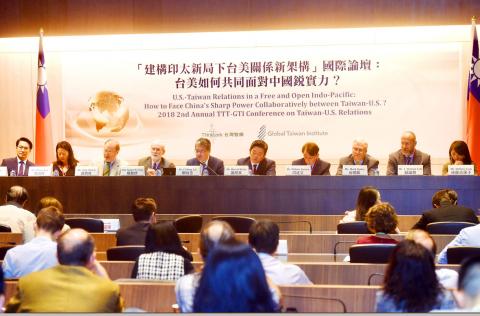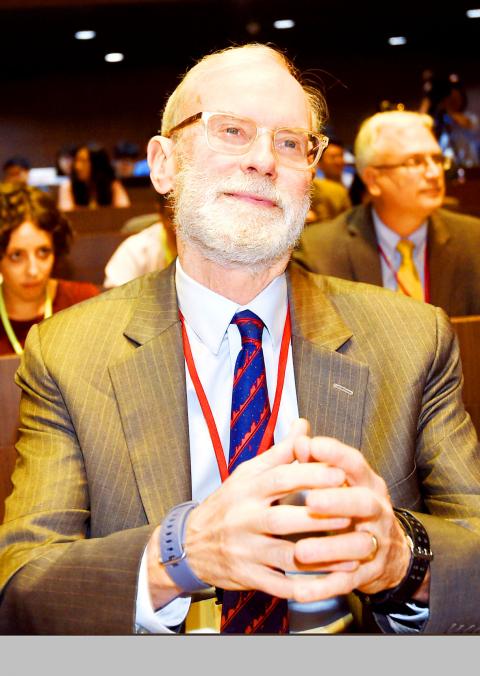Two former American Institute in Taiwan (AIT) directors and other analysts from the US yesterday urged a renewed effort between the US and Taiwan to negotiate a free-trade agreement (FTA) as President Tsai Ing-wen (蔡英文) struggles to convince Taiwanese not to depend on China for economic prosperity.
They made the call at a forum on Taiwan-US relations hosted by the Taiwan Thinktank and the Washington-based Global Taiwan Institute in Taipei.
This year’s event focused on how Taiwan and the US can work together to face China’s power.

Photo: Chien Jung-fong, Taipei Times
As China’s sharp power influence grows, in addition to finding a more creative approach to support Taiwan’s military needs and encouraging visits by senior-level US officials, Washington should also renew efforts to nail down an FTA with Taipei at an early date, former AIT director Stephen Young said.
“But Taiwan needs to do something to control some of its agricultural lobby demands,” Young said, referring to opposition to the lifting of a ban on the import of US pork containing the leanness-enhancing drug ractopamine and US beef offal products.
Taiwan’s import restrictions on US pork and certain beef products have long been considered a major hurdle in trade relations, most notably impeding the signing of a Trade and Investment Framework Agreement (TIFA).

Photo: Chien Jung-fong, Taipei Times
Former AIT director William Stanton said the US government should also look at the inking of an FTA with Taiwan from a more strategic point of view.
“If you look at the history of the US’ FTAs, the very first FTA we had was with Israel. Was it because we thought Israel was an important economic partner? Or why did we have an FTA with Morocco or Jordan? Was it because they were important economic partners? No, it was … for strategic reasons,” he said.
In the same vein, the US needs to think more strategically about Taiwan and “not just simply [about] the need to export more pork to Taiwan,” Stanton said.

Photo: Chien Jung-fong, Taipei Times
Nien Su (蘇思年), a former chief economic adviser to the US House of Representatives Committee on Foreign Affairs, said that with the strong bipartisan support Taiwan enjoys in the US Congress, free trade is an area both sides can work on, but the Taiwanese government needs to give a clear signal of intent to the US.
Taiwan and the US should make free trade a priority next year and try to achieve positive movement on trade negotiations or any type of agreement before 2020 to avoid another missed opportunity, Su said.
The window of opportunity is rapidly closing as more issues are being put on the plate of US policymakers, he added.

Photo: Chien Jung-fong, Taipei Times
However, Project 2049 Institute executive director Mark Stokes suggested signing a fair-trade agreement instead.
A fair-trade agreement would not only be in the US’ political interest, it would also be conducive to Taiwan and the US moving toward a more normal, stable and constructive relationship, said Stokes, a former Pentagon official who served as senior country director for Taiwan and China.
Commenting on the nine-in-one elections, Taiwan Thinktank chairman Wu Rong-i (吳榮義) said it was very “regrettable” that during the campaign, Taiwan had suffered systematic and organized disinformation efforts from China designed to influence Taiwanese voters.
“China is also facilitating the dissemination of false information through the control of newspaper, television, radio and online media in Taiwan. Even more disturbing is that China has directly supported the pro-China forces within Taiwan to speak on behalf of Beijing,” Wu said, calling China’s sharp power a “Trojan horse.”
Stanton said he only has one concern regarding Taiwan’s recent elections, which is that some people might misinterpret the results as that the majority of Taiwanese hope to see a closer cross-strait relationship.
He said economic issues, such as low salaries and high housing prices, were more likely the reasons behind the Democratic Progressive Party’s losses.
John Tkacik, director of the US-based International Assessment and Strategy Center’s Future Asia Project, said China is a rising power that is attempting to dismantle the geopolitical “status quo” in the Indo-Pacific.
“Taiwan’s unique geographic position in the Western Pacific … fits into the partnership strategy to meet the challenges of China’s global aspirations, i.e. the ‘China Dream’ and the Belt and Road Initiative,” Tkacik said.
Taiwan has a clearly important role to play in keeping the Indo-Pacific region free and open, he said.

MAKING WAVES: China’s maritime militia could become a nontraditional threat in war, clogging up shipping lanes to prevent US or Japanese intervention, a report said About 1,900 Chinese ships flying flags of convenience and fishing vessels that participated in China’s military exercises around Taiwan last month and in January last year have been listed for monitoring, Coast Guard Administration (CGA) Deputy Director-General Hsieh Ching-chin (謝慶欽) said yesterday. Following amendments to the Commercial Port Act (商港法) and the Law of Ships (船舶法) last month, the CGA can designate possible berthing areas or deny ports of call for vessels suspected of loitering around areas where undersea cables can be accessed, Oceans Affairs Council Minister Kuan Bi-ling (管碧玲) said. The list of suspected ships, originally 300, had risen to about

DAREDEVIL: Honnold said it had always been a dream of his to climb Taipei 101, while a Netflix producer said the skyscraper was ‘a real icon of this country’ US climber Alex Honnold yesterday took on Taiwan’s tallest building, becoming the first person to scale Taipei 101 without a rope, harness or safety net. Hundreds of spectators gathered at the base of the 101-story skyscraper to watch Honnold, 40, embark on his daredevil feat, which was also broadcast live on Netflix. Dressed in a red T-shirt and yellow custom-made climbing shoes, Honnold swiftly moved up the southeast face of the glass and steel building. At one point, he stepped onto a platform midway up to wave down at fans and onlookers who were taking photos. People watching from inside

Japan’s strategic alliance with the US would collapse if Tokyo were to turn away from a conflict in Taiwan, Japanese Prime Minister Sanae Takaichi said yesterday, but distanced herself from previous comments that suggested a possible military response in such an event. Takaichi expressed her latest views on a nationally broadcast TV program late on Monday, where an opposition party leader criticized her for igniting tensions with China with the earlier remarks. Ties between Japan and China have sunk to the worst level in years after Takaichi said in November that a hypothetical Chinese attack on Taiwan could bring about a Japanese

The WHO ignored early COVID-19 warnings from Taiwan, US Deputy Secretary of Health and Human Services Jim O’Neill said on Friday, as part of justification for Washington withdrawing from the global health body. US Secretary of State Marco Rubio on Thursday said that the US was pulling out of the UN agency, as it failed to fulfill its responsibilities during the COVID-19 pandemic. The WHO “ignored early COVID warnings from Taiwan in 2019 by pretending Taiwan did not exist, O’Neill wrote on X on Friday, Taiwan time. “It ignored rigorous science and promoted lockdowns.” The US will “continue international coordination on infectious